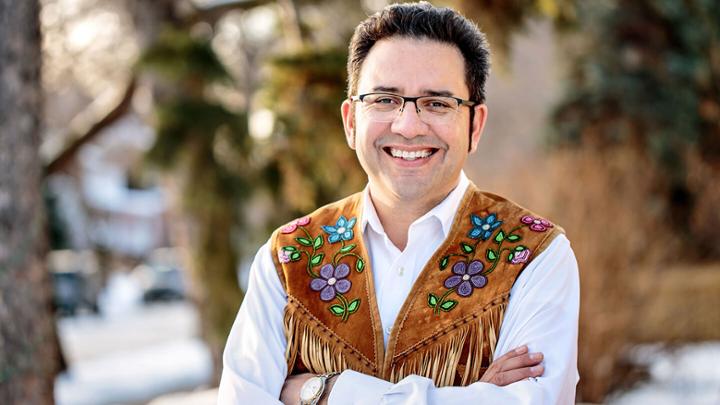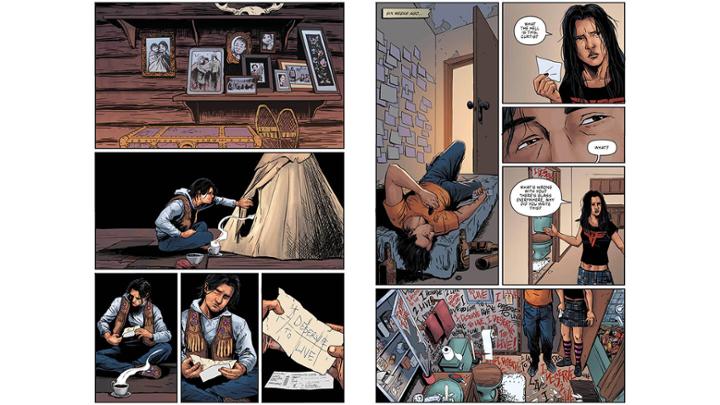Comic relief
September 20, 2023

Richard Van Camp reflects on the comic book that saved his life, then inspired his writing career—and the ever-growing garden of Indigenous literature.
Author Richard Van Camp’s first exposure to comics happened after he suffered a burst appendix when he was a child. “I woke up in an oxygen tent in the hospital: one of my lungs had collapsed, my blood turned septic and I had a drainage tube hanging out of my stomach—it was really scary,” he says, recalling the near-death experience. “Two friends down the street came to visit me and gave me their entire comic book collection because they were told I wasn't gonna make it.”
Tucked in among those copies of X-Men, Unknown Soldier and Fantastic Four was issue 13 of DC’s hidden-world fantasy series The Warlord, which started him on a lifelong passion for reading and writing. “I made a deal with myself: I said, ‘I'm not gonna die because I gotta figure out how this guy got there.’” But when Van Camp had recovered enough to get to a store, he discovered he had actually read a back issue: by then, Warlord was up to number 42. “I was so happy because I had a quest to find the other 40 issues… it actually took me about 10 years to collect every single one,” he laughs, speaking from his home in Edmonton.
Power of graphic novels
It also got him thinking about comic books as a vehicle to tell his own stories. “I write to this very day because of that particular comic,” he says. “I always wanted to showcase the beauty, grace and intrigue of our culture and the Northwest Territories, everything that the North has had to overcome due to residential schools. We've come so close to losing so much, and I really feel that graphic novels are the perfect medium for reclamation.”
Van Camp is one of the most prolific writers to emerge from UVic’s acclaimed Writing program. A proud Dogrib Tłı̨chǫ writer of the Dene nation from Fort Smith, NWT, the multiple award-winning author has published a remarkable 27 books over the past 27 years. He shows no sign of slowing down, writing across genres, including novels, short stories, children’s books and graphic novels.
Van Camp’s debut novel—1996’s The Lesser Blessed—was published while he was still a UVic student, and his new 400-page “spiritual thriller” Beast is forthcoming in 2024 from Douglas & McIntyre. His latest project, however, is the gloriously illustrated graphic novel As I Enfold You in Petals (HighWater Press), book two of his Spirit of Denendeh series.

As I Enfold You in Petals offers both an unflinching look at Indigenous addiction spirals and an inspiring glimpse into how healing journeys can offer hope to an entire community. It also allows Van Camp the chance to further the arc of characters who have now appeared in five of his short-story collections, as well as Spirit of Denendeh book one A Blanket of Butterflies (also created with Petals illustrator Scott B. Henderson and colourist Donovan Yaciuk).
“It's like this perfectly illustrated complement to a universe that just continues to grow,” Van Camp says.
“I’m really proud of what we're doing here… this is beautiful, important storytelling. These graphic novels are a perfect welcome into the greater body of Indigenous literature that's out there now, which is a garden that just keeps growing.”
Indigenous literature flourishing
Looking back over his own career, Van Camp is heartened by the current market for Indigenous storytelling. “I think back to the early ’90s and there might have been 10 Indigenous authors who were recognized—but now, the bestseller lists are filled with Indigenous names… and the best part is, I haven't even read all the books yet! In my own lifetime, we've seen a marginalized voice become commonplace in so many Canadian and international households and bookshelves. That makes me very happy and very proud: I'm proud to witness it, I'm proud to be a part of it and I'm proud to be a mentor for new voices. I'm also just grateful to be a reader—I'm the biggest fan of Indigenous literature, and when I sit down with a new book every day is like Christmas.”
From student to mentor
In 2020, Van Camp received a UVic Distinguished Alumni Award to add to his accolades. He is quick to acknowledge the mentors he worked with at UVic, and the influence they continue to have on him as a writing instructor himself.
“I give so much credit to UVic for my success, because I had access to professors like Bill Valgardson, Stephen Hume, Marilyn Bowering, Jack Hodgins, Stephen Osborne… and I was in class with students like Aislinn Hunter, Billeh Nickerson, Heather MacLeod, Teresa McWhirter. To this day, my classes and workshops are all based on the UVic model.”He’s also mindful to pay it forward: he’s now in his third year of working with young writers as part of the Audible Indigenous Writers’ Circle, among other mentorship activities like being writer-in-residence in connection with the University of Alberta, Yellowhead Tribal College, MacEwan University, Calgary Public Library and the Metro Federation of Edmonton Libraries.
“You see the talent, you see the hunger, you see where you were 20 years ago where you were willing to do anything to get your manuscript into the right hands,” he says. “My goal is always to get them one step closer to a publishing house or an agent, because I love it when I get to help make good things happen.”
Regardless of format or genre, Van Camp says he’s just happy to be writing at this time in history. “I'm thrilled that we're living at a time where you don't know who's going to publish what next,” he says. “It’s bringing out the best work in everybody. But it also means you can't slack, you can't phone it in. You've always got to bring your best.”
—John Threlfall, BA ’96